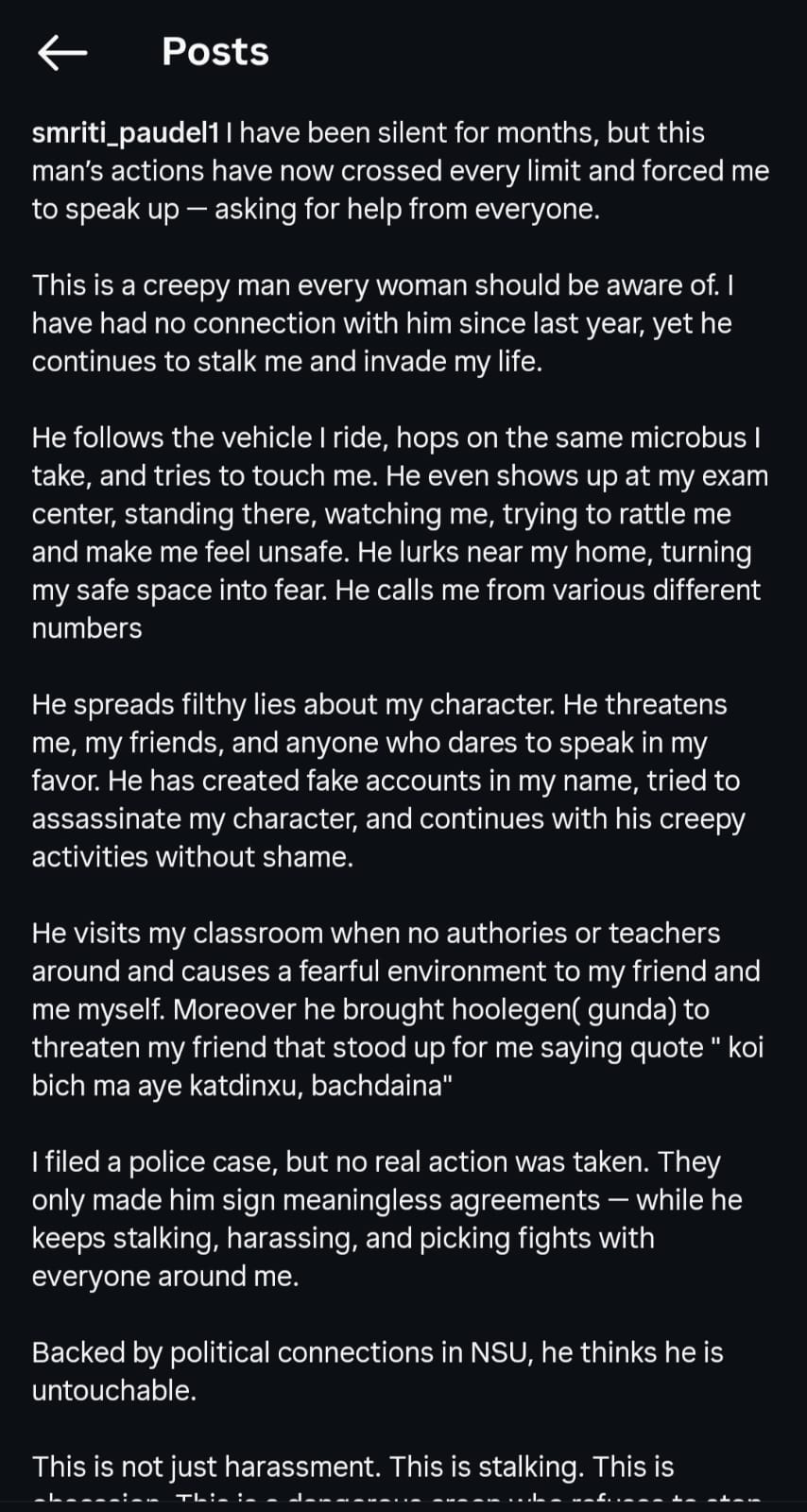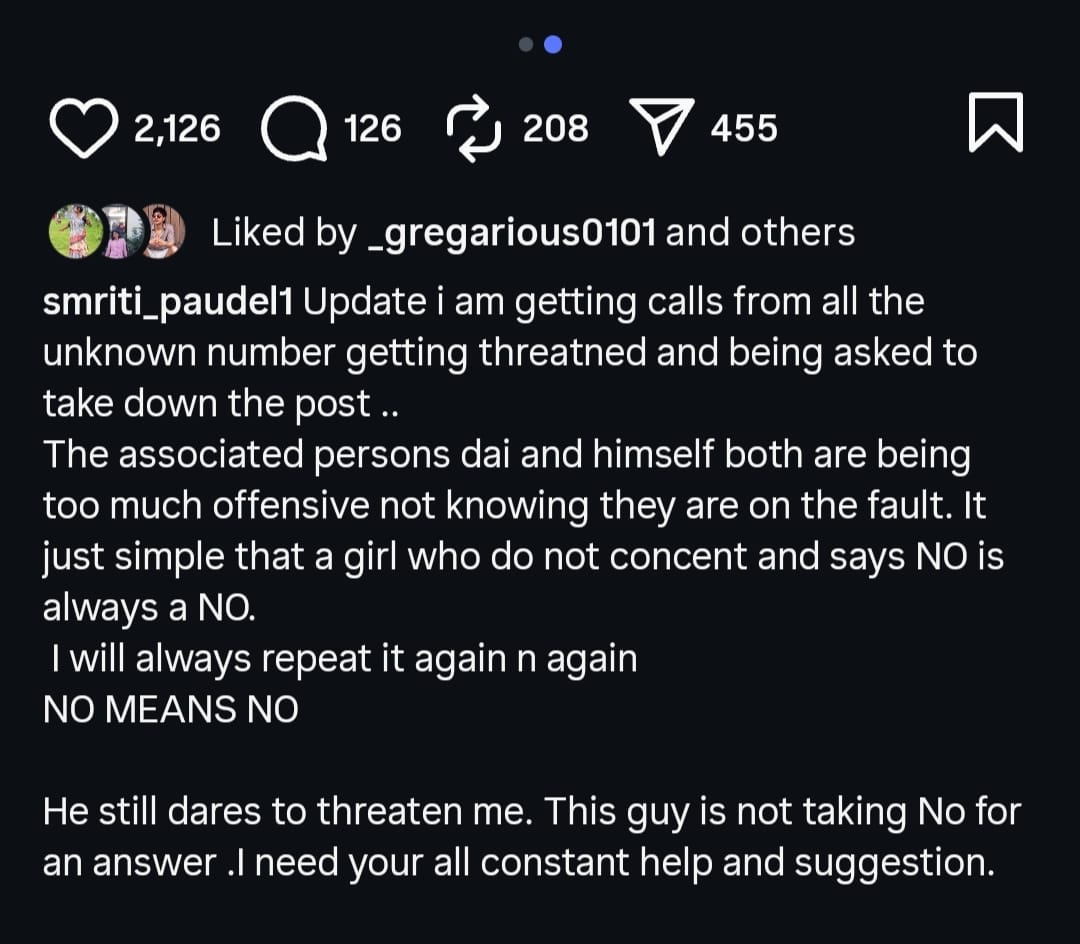Valley
Women share how stalking leaves lasting trauma and fear
Smriti Paudel’s story has initiated a public conversation on stalking and consent in Nepal.
Aarati Ray
On Friday, Smriti Paudel, a bachelor’s level student at Amrit Science College (ASCOL) in Lainchaur, uploaded an Instagram post with a blunt declaration, “Enough is enough. Calling for safety.”
Her 11-page post accused Sumit Bhattarai of stalking and harassing her for over a year.
“I have been silent for months,” the post begins. “But this man’s actions have now crossed every limit and forced me to speak up… This is a creepy man every woman should be aware of.”
Within hours, the post went viral. Till Sunday evening, it had more than 10 thousand likes, 800 comments, and 13,000 shares. The comments flooded in with support for Paudel, including from other women recounting how normalised stalking has become.

Paudel’s story has now initiated a public conversation on stalking and consent in Nepal.
According to Paudel’s post, the physical and cyberstalking had been relentless since last year.
“He follows the vehicle I ride, hops on the same microbus I take, and tries to touch me,” she wrote. “He even shows up at my exam centre… He lurks near my home, turning my safe space into fear. He calls me from countless numbers.”

The post is accompanied by videos of Bhattarai lurking near her home, following her on the streets and microbus, and ignoring her pleas to stay away.
At her college, ASCOL, where Paudel is a sixth-semester CSIT student and Bhattarai, a graduate, would show up when faculty and administrators were absent. “He even brought hooligans to threaten my friend who stood up for me, saying, ‘If anyone interferes, I will hack them,’” she wrote.
Paudel said she had repeatedly turned to the police, only to face weak responses.
“They only made him sign meaningless agreements, while he keeps stalking, harassing, and picking fights with everyone around me. Backed by political connections in NSU [Nepal Students’ Union, the student wing of Nepali Congress], he thinks he is untouchable,” her post read.
The Post’s attempts to contact Bhattarai were unsuccessful. His phone lines were unreachable, and all of his social media accounts appear to be inactive.
On Saturday, Paudel shared in a second post that she had started receiving threats from Bhattarai and his brother, demanding she remove her posts.

Her father confirmed to the Post about the incidents posted on Instagram. He said the family had re-filed a First Information Report (FIR) with the police on Sunday. “We are following the legal process,” he said, “but Smriti does not want to directly engage with the media or appear in interviews as she is overwhelmed.”
As of Paudel’s latest update on Sunday evening, she visited the Sorahkhutte police station for another round of consultations and later proceeded to the Kalimati police station, where the accused was finally taken into custody after public pressure.
But the arrest has done little to reassure Paudel and those supporting her.
A close friend and classmate, who has supported her throughout the ordeal, recalls how previous complaints at Balkhu, Balaju, and Sorahkhutte police stations led nowhere.
“Cases were filed multiple times, there were so-called negotiations, and the next day, Bhattarai would show up in the classroom, threatening her, trying to assault her, even issuing rape threats,” the friend said.
“Even now, I’m scared. What happens when he’s released? The police have told her before, ‘Victims just need to be careful in these cases; there’s no proper law to address this,’” Paudel’s friend added.
Paudel’s story has triggered a conversation online about stalking, the culture of entitlement and the pervasive disregard for consent.
Her post, many commenters said, is not an isolated story but a mirror of what countless women endure in silence every day.
Take Babita (a pseudonym), from Biratnagar, who still remembers the terror she endured four years ago. For six long months, she was stalked by a man who lived across the street.
She never told anyone. “I was always in fear,” she said. “In our society, if something like this comes out, it’s the woman who gets blamed, branded as promiscuous.”
The stalking eventually ended after six months. But years later, Babita says that even a distant call or nearby footsteps can still trigger intense panic.
“I’d heard so many stories of rape and violence cases where women’s testimonies were dismissed by the police,” adds Babita. “I thought the police would not even consider my case, as I had no physical assault evidence to prove.”
Experts say stalking affects mental health even when there is no physical violence.
According to Bina Shrestha, a mental health expert, it can cause trauma and PTSD. Victims develop trust issues, self-doubt, and anxiety about going out. “Because of the idea that this behaviour comes from ‘someone liking them,’ victims may internalise blame. They may think, ‘I shouldn’t dress up,’ and give up self-care,” added Shrestha.
For Swikriti (a pseudonym), 22, from Lalitpur, the trauma is recent. Just a week after ending a controlling relationship, she first saw her ex outside Kathmandu’s Ratna Rajya Laxmi Campus, leaning on his motorbike.
At first, she brushed it off as a coincidence. But then it kept happening. Outside her college. Down her street. And, eventually, online.
Messages switched between begging her to come back and threatening her if she didn’t. “He knew where I had been, who I was with,” said Swikriti. She even stopped going out unless absolutely necessary.
Despite the relentless harassment, she never went to the police. Her family feared judgment and character assassination of her daughter for having been in a relationship with him. Her neighbours and even friends would say, “Oh, they’re in a relationship, we shouldn’t interfere.”
“Nobody understood that the relationship had ended, and even if it hadn’t, that doesn’t give him the right to harass me,” she said.
The stalking ended only after her elder brothers confronted him, but Swikriti continues to suffer from anxiety attacks and attends therapy for PTSD.
Following Paudel’s post, while the majority expressed support, many, particularly men, dismissed her situation as an act of ‘true love’ or claimed she was overreacting. Some even suggested that Paudel must still be in a relationship with Bhattarai, implying that his stalking was justified.
Activists and experts say this reflects deep-rooted gender norms in Nepal.
Sharada Puri, a psychologist and activist who has worked with numerous victims of stalking, many of them teenagers, says stalking is becoming alarmingly common.
According to Puri, the root of the problem lies in societal misunderstanding of consent that spans generations. “It’s largely because of the mentality that, ‘Oh, she’s my girlfriend or I am pursuing her, so I can do anything with her,’ or, ‘She’s my wife, so I have the right to control her,’” she says.
“Even if a girl is in love with someone, it doesn’t give the man the right to stalk her,” adds Anjali Sah, a feminist activist and law student who has seen many such stalking cases.
According to Sah, in Nepali society, the idea of love and consent is often distorted, much like in the movie Kabir Singh, where the protagonist’s stalking, coercion, and volatile behaviour were glorified as signs of passion or ‘true’ love.
Nepal Police does not categorise stalking as a standalone crime.
Binod Ghimire, DIG and spokesperson for Nepal Police, admitted, “I’m not aware of receiving such cases. We don’t have specific data on stalking.”
Ghimire explained that in stalking, depending on severity, police may sometimes issue warnings rather than pursue cases, especially if minors are involved. He assured that when victims file the case, they take the case seriously.
But victims and their advocates say otherwise.
Puri notes, police rarely take these cases seriously, and there is victim-blaming and judgment when the stalker is an ex-partner. Most of the time, they just push for a basic agreement or reconciliation, without considering the safety or well-being of the girl, she adds.
“Even law enforcement lacks a proper understanding of stalking,” adds Sagar Pathak, an advocate at Forum for Women, Law and Development. Victims, he says, are often met with dismissive responses such as, “What harm can simply following someone do?” or “Maybe the victim is mistaken or overreacting,” or even, “Are people not even allowed to look now?”
This negligence, Puri says, ignores the psychological trauma victims endure. “Law enforcement tends to say, ‘Oh, there’s no physical or sexual harassment, so there’s nothing serious,’” she adds.
Pathak explains that there is no specific law in Nepal that directly addresses stalking. It is often viewed under the broader categories of misconduct or indecent behaviour, or at times as a form of sexual harassment.
But even within sexual harassment, while there are many defined acts, such as teasing or unwanted touching, persistently staring at someone, following them, or shadowing them, behaviours that fall under stalking are not explicitly recognised.
When stalking is treated as misconduct or as part of sexual harassment, Pathak explains, then it falls under provisions that are classified as ‘individual party criminal offences’.
This means the burden falls on the victim to collect, present evidence and personally pursue the case in court. Because of this, Pathak says, very few victims actually take stalking cases to court.
Cyberstalking has similar blind spots. Deepak Raj Awasthi, spokesperson for the Cyber Bureau, said, “Our Electronic Transaction Act doesn’t clearly define cyber stalking. We file such cases under broader harassment categories.”
According to Awasthi, while there is no exact data on cyberstalking, many women experience it through fake online profiles.
Paudel’s Instagram post made visible what many women already know: stalking is pervasive, normalised, and rarely punished. Laws have not caught up. Police record-keeping doesn’t capture it. Families and communities still tell women to keep quiet.
Pathak calls for urgent reform. “The law must explicitly define stalking so that police can register cases and victims have a clear legal pathway,” he says. “And law enforcement needs to be sensitised for victim and survivor-centric investigation.”
Following Bhattarai’s arrest, Paudel wrote in her latest post: “While this is a step toward justice, I am deeply disappointed with Nepal’s legal system. A perpetrator is punished only after a long, exhausting journey of constant follow-ups, repeated written appeals, and, when all else fails, the desperate need to call public support.”




 21.12°C Kathmandu
21.12°C Kathmandu












